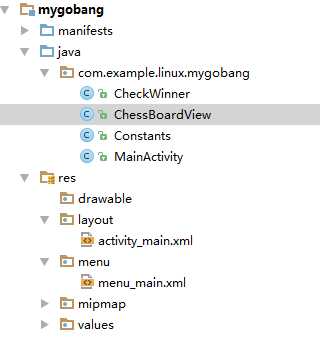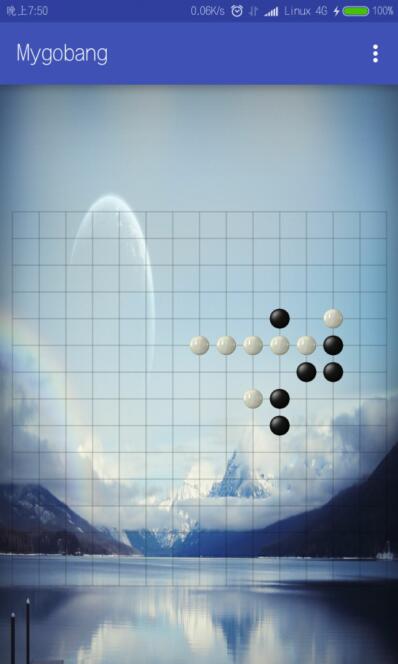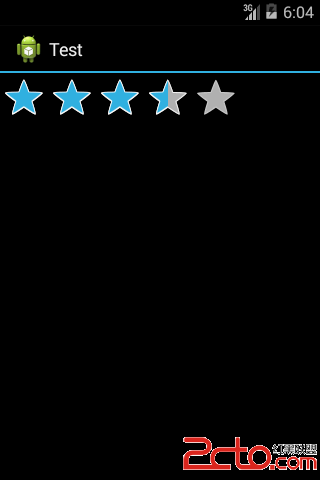編輯:關於Android編程
最近學習了五子棋的課程,感覺挺不錯。然後自己寫了個關於五子棋的android程序,從中還是能夠學習到很多東西的。現在我們開始今天五子棋程序的編寫歷程。程序的源碼請參見友情鏈接:
好了,我們現在開始一步步的構建出項目來,首先是如下的項目結構圖:

運行的效果圖:

一些前期做准備的代碼
1、 主活動類MainActivity,在菜單中加入了再來一局的功能:
public class MainActivity extends AppCompatActivity {
private ChessBoardView chessBoardView;
@Override
protected void onCreate(Bundle savedInstanceState) {
super.onCreate(savedInstanceState);
setContentView(R.layout.activity_main);
chessBoardView = (ChessBoardView) findViewById(R.id.boardView);
}
@Override
public boolean onOptionsItemSelected(MenuItem item) {
int id = item.getItemId();
// 再來一局
if (id == R.id.action_setting) {
chessBoardView.start();
return true;
}
return super.onOptionsItemSelected(item);
}
@Override
public boolean onCreateOptionsMenu(Menu menu) {
getMenuInflater().inflate(R.menu.menu_main, menu);
return true;
}
}
2、常量類便於維護管理:Constants
public class Constants {
// 五子連珠
public final static int MAX_COUNT_IN_LINE = 5;
// 棋盤的行數
final static int MAX_LINE = 15;
// 檢查的方向
final static int HORIZONTAL = 0;
final static int VERTICAL = 1;
final static int LEFT_DIAGONAL = 2;
final static int RIGHT_DIAGONAL = 4;
}
3、activity_main.xml中增加了自定義棋盤的View:
<?xml version="1.0" encoding="utf-8"?> <RelativeLayout xmlns:android="http://schemas.android.com/apk/res/android" xmlns:tools="http://schemas.android.com/tools" android:layout_width="match_parent" android:layout_height="match_parent" android:background="@mipmap/bg" tools:context="com.example.linux.mygobang.MainActivity"> <com.example.linux.mygobang.ChessBoardView android:id="@+id/boardView" android:layout_centerInParent="true" android:layout_width="match_parent" android:layout_height="match_parent" /> </RelativeLayout>
4、menu_main.xml中定義再來一局的菜單:
<?xml version="1.0" encoding="utf-8"?> <menu xmlns:tools="http://schemas.android.com/tools" xmlns:android="http://schemas.android.com/apk/res/android"> <item android:id="@+id/action_setting" android:title="再來一局" android:orderInCategory="100" android:showAsAction="never" tools:ignore="AppCompatResource" /> </menu>
自定義棋盤的View
ChessBoardView類,是整個程序比較核心的部分。
1、初始化工作,程序中用到的變量也放在下面的代碼中:
// 棋盤的寬度,也是長度
private int mViewWidth;
// 棋盤每格的長度
private float maxLineHeight;
private Paint paint = new Paint();
// 定義黑白棋子的Bitmap
private Bitmap mwhitePiece, mblackPiece;
private float ratioPieceOfLineHeight = 3 * 1.0f / 4;
// 判斷當前落下的棋子是否是白色的
private boolean mIsWhite = true;
// 記錄黑白棋子位置的列表
private ArrayList<Point> mwhiteArray = new ArrayList<>();
private ArrayList<Point> mblackArray = new ArrayList<>();
// 游戲是否結束
private boolean mIsGameOver;
// 游戲結束,是否是白色方勝利
private boolean mIsWhiteWinner;
public ChessBoardView(Context context, AttributeSet attrs) {
super(context, attrs);
init();
}
private void init() {
paint.setColor(0x88000000);
paint.setAntiAlias(true);
paint.setDither(true);
paint.setStyle(Paint.Style.STROKE);
mwhitePiece = BitmapFactory.decodeResource(getResources(), R.mipmap.stone_w2);
mblackPiece = BitmapFactory.decodeResource(getResources(), R.mipmap.stone_b1);
}
2、onMeasure方法,測量View的大小,使View的長寬一致。
@Override
protected void onMeasure(int widthMeasureSpec, int heightMeasureSpec) {
int widthSize = MeasureSpec.getSize(widthMeasureSpec);
int widthModel = MeasureSpec.getMode(widthMeasureSpec);
int heightSize = MeasureSpec.getSize(heightMeasureSpec);
int heightModel = MeasureSpec.getMode(heightMeasureSpec);
int width = Math.min(widthSize, heightSize);
if (widthModel == MeasureSpec.UNSPECIFIED) {
width = heightSize;
} else if (heightModel == MeasureSpec.UNSPECIFIED) {
width = widthSize;
}
setMeasuredDimension(width, width);
}
2、onSizeChanged方法在布局的階段,如果View的大小發生改變,此方法得到調用。
@Override
protected void onSizeChanged(int w, int h, int oldw, int oldh) {
super.onSizeChanged(w, h, oldw, oldh);
mViewWidth = w;
maxLineHeight = mViewWidth * 1.0f / Constants.MAX_LINE;
int pieceWidth = (int) (maxLineHeight * ratioPieceOfLineHeight);
mwhitePiece = Bitmap.createScaledBitmap(mwhitePiece, pieceWidth, pieceWidth, false);
mblackPiece = Bitmap.createScaledBitmap(mblackPiece, pieceWidth, pieceWidth, false);
}
4、onTouchEvent方法中處理我們下棋子的位置:
@Override
public boolean onTouchEvent(MotionEvent event) {
if (mIsGameOver) {
return false;
}
int action = event.getAction();
if (action == MotionEvent.ACTION_UP) {
int x = (int) event.getX();
int y = (int) event.getY();
Point point = getValidPoint(x, y);
if (mwhiteArray.contains(point) || mblackArray.contains(point)) {
return false;
}
if (mIsWhite) {
mwhiteArray.add(point);
} else {
mblackArray.add(point);
}
invalidate();
mIsWhite = !mIsWhite;
}
return true;
}
5、在onDraw方法做棋盤的繪制工作:
@Override
protected void onDraw(Canvas canvas) {
super.onDraw(canvas);
// 繪制棋盤的網格
drawBoard(canvas);
// 繪制棋盤的黑白棋子
drawPieces(canvas);
// 檢查游戲是否結束
checkGameOver();
}
6、接下來,我們按上面的流程,一個個的做詳細的解釋:
繪制棋盤的網格:
// 繪制棋盤的網線
private void drawBoard(Canvas canvas) {
int w = mViewWidth;
float lineHeight = maxLineHeight;
for (int i = 0; i < Constants.MAX_LINE; i++) {
int startX = (int) (lineHeight / 2);
int endX = (int) (w - lineHeight / 2);
int y = (int) ((0.5 + i) * lineHeight);
canvas.drawLine(startX, y, endX, y, paint);
canvas.drawLine(y, startX, y, endX, paint);
}
}
繪制棋盤的黑白棋子:
// 根據黑白棋子的數組繪制棋子
private void drawPieces(Canvas canvas) {
for (int i = 0, n = mwhiteArray.size(); i < n; i++) {
Point whitePoint = mwhiteArray.get(i);
float left = (whitePoint.x + (1 - ratioPieceOfLineHeight) / 2) * maxLineHeight;
float top = (whitePoint.y + (1 - ratioPieceOfLineHeight) / 2) * maxLineHeight;
canvas.drawBitmap(mwhitePiece, left, top, null);
}
for (int i = 0, n = mblackArray.size(); i < n; i++) {
Point blackPoint = mblackArray.get(i);
float left = (blackPoint.x + (1 - ratioPieceOfLineHeight) / 2) * maxLineHeight;
float top = (blackPoint.y + (1 - ratioPieceOfLineHeight) / 2) * maxLineHeight;
canvas.drawBitmap(mblackPiece, left, top, null);
}
}
檢查游戲是否已經結束:
// 檢查游戲是否結束
private void checkGameOver() {
CheckWinner checkWinner = new CheckWinner();
boolean whiteWin = checkWinner.checkFiveInLineWinner(mwhiteArray);
boolean blackWin = checkWinner.checkFiveInLineWinner(mblackArray);
if (whiteWin || blackWin) {
mIsGameOver = true;
mIsWhiteWinner = whiteWin;
String text = mIsWhiteWinner ? "白棋勝利" : "黑棋勝利";
Toast.makeText(getContext(), text, Toast.LENGTH_SHORT).show();
}
}
保存殘局並恢復棋局
1、 保存殘局,例如切換橫堅屏時:
private static final String INSTANCE = "instance";
private static final String INSTANCE_GAME_OVER = "instance_game_over";
private static final String INSTANCE_WHITE_ARRAY = "instance_white_array";
private static final String INSTANCE_BLACK_ARRAY = "instance_black_array";
@Override
protected Parcelable onSaveInstanceState() {
Bundle bundle = new Bundle();
bundle.putParcelable(INSTANCE, super.onSaveInstanceState());
bundle.putBoolean(INSTANCE_GAME_OVER, mIsGameOver);
bundle.putParcelableArrayList(INSTANCE_BLACK_ARRAY, mblackArray);
bundle.putParcelableArrayList(INSTANCE_WHITE_ARRAY, mwhiteArray);
return bundle;
}
2、 從bundle中恢復棋局:
@Override
protected void onRestoreInstanceState(Parcelable state) {
if (state instanceof Bundle) {
Bundle bundle = (Bundle) state;
mIsGameOver = bundle.getBoolean(INSTANCE_GAME_OVER);
mwhiteArray = bundle.getParcelableArrayList(INSTANCE_WHITE_ARRAY);
mblackArray = bundle.getParcelableArrayList(INSTANCE_BLACK_ARRAY);
super.onRestoreInstanceState(bundle.getParcelable(INSTANCE));
return;
}
super.onRestoreInstanceState(state);
}
3、 增加再來一局游戲的邏輯:
// 再來一局
public void start() {
mwhiteArray.clear();
mblackArray.clear();
mIsGameOver = false;
mIsWhiteWinner = false;
invalidate();
}
判斷游戲是否結束的算法
在CheckWinner中,對棋盤中的棋子做”米“字型的檢查是否五子連珠:
1、 check方法中,針對不同的方向,做判斷:
private boolean check(int x, int y, List<Point> points, int checkOri) {
int count = 1;
for (int i = 1; i < Constants.MAX_COUNT_IN_LINE; i++) {
switch (checkOri) {
case Constants.HORIZONTAL:
point1 = new Point(x - i, y);
break;
case Constants.VERTICAL:
point1 = new Point(x, y - i);
break;
case Constants.LEFT_DIAGONAL:
point1 = new Point(x - i, y + i);
break;
case Constants.RIGHT_DIAGONAL:
point1 = new Point(x + i, y + i);
break;
}
if (points.contains(point1)) {
count++;
} else {
break;
}
}
for (int i = 1; i < Constants.MAX_COUNT_IN_LINE; i++) {
switch (checkOri) {
case Constants.HORIZONTAL:
point2 = new Point(x + i, y);
break;
case Constants.VERTICAL:
point2 = new Point(x, y + i);
break;
case Constants.LEFT_DIAGONAL:
point2 = new Point(x + i, y - i);
break;
case Constants.RIGHT_DIAGONAL:
point2 = new Point(x - i, y - i);
break;
}
if (points.contains(point2)) {
count++;
} else {
break;
}
}
if (count == Constants.MAX_COUNT_IN_LINE) {
return true;
}
return false;
}
2、 做四個方向檢查:
// 橫向判斷
private boolean checkHorizontal(int x, int y, List<Point> points) {
checkModel = Constants.HORIZONTAL;
return check(x, y, points, checkModel);
}
// 豎向判斷
private boolean checkVertical(int x, int y, List<Point> points) {
checkModel = Constants.VERTICAL;
return check(x, y, points, checkModel);
}
// 左斜判斷
private boolean checkLeftDiagonal(int x, int y, List<Point> points) {
checkModel = Constants.LEFT_DIAGONAL;
return check(x, y, points, checkModel);
}
// 右斜判斷
private boolean checkRighttDiagonal(int x, int y, List<Point> points) {
checkModel = Constants.RIGHT_DIAGONAL;
return check(x, y, points, checkModel);
}
3、 做具體的判斷,是否游戲結束:
private Point point1, point2;
private int checkModel = -1;
public boolean checkFiveInLineWinner(List<Point> points) {
for (Point point : points) {
int x = point.x;
int y = point.y;
if (checkHorizontal(x, y, points)) {
return true;
} else if (checkVertical(x, y, points)) {
return true;
} else if (checkLeftDiagonal(x, y, points)) {
return true;
} else if (checkRighttDiagonal(x, y, points)) {
return true;
}
}
return false;
}
源碼下載:Android五子棋游戲程序
以上就是本文的全部內容,希望對大家學習Android軟件編程有所幫助。
 Android開發之RatingBar控件
Android開發之RatingBar控件
RatingBar控件為用戶提供一個評分操作的模式。 控件的幾個常用方法:1.setMax()設置RatingBar星級滑塊的最大值.2.setNumStars
 Android自定義組合控件---教你如何自定義下拉刷新和左滑刪除
Android自定義組合控件---教你如何自定義下拉刷新和左滑刪除
緒論最近項目裡面用到了下拉刷新和左滑刪除,網上找了找並沒有可以用的,有比較好的左滑刪除,但是並沒有和下拉刷新上拉加載結合到一起,要不就是一些比較水的結合,並不能在項目裡面
 詳細解析RxAndroid的使用方式
詳細解析RxAndroid的使用方式
RxAndroid是RxJava的擴展, 可以優雅地處理異步請求. 以前的文章講述過一些, 這次再補充些內容, 熟悉RxAndroid的使用方法.本文源碼的GitHub下
 Android Studio中配置OpenCV庫開發環境的教程
Android Studio中配置OpenCV庫開發環境的教程
1、下載進入官網(http://opencv.org/)下載OpenCV4Android並解壓。目錄結構如下圖所示。其中,sdk目錄即是我們開發opencv所需要的類庫;